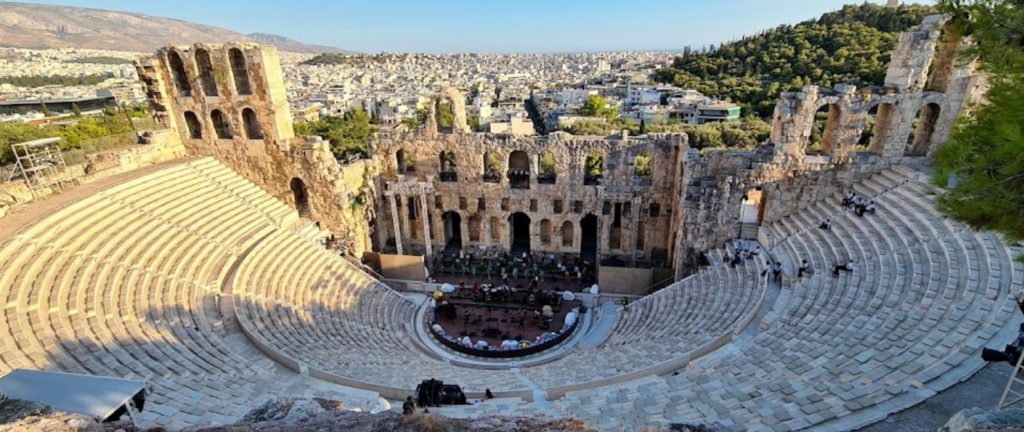
The Smith Center of Performing Arts
Theater is a great way to express yourself, be creative, and share a broad imagination. And on March 27th, we celebrate World Theater Day! To celebrate, I interviewed Kelly Leahy, an employee from The Smith Center for the Performing Arts, a local theater in Las Vegas. We spoke about the Center, what theater means to her, and why World Theater Day is important.
Opening in March 2012, The Smith Center celebrates its 10-year-anniversary this month. According to the Smith Center website, “before the opening of The Smith Center, Las Vegas remained the largest community in North America without a performing arts center, an element that defines most of the great cities in the world.”
The Pandemic’s Impacts on The Smith Center
Due to COVID-19, The Smith Center closed down for more than a year. On September 14, 2021, the Smith Center raised the curtains for the first time since March 2020.
“When the pandemic began, we thought we’d only be closed for two months. As the pandemic continued for many more months, we were greatly affected,” Leahy said. “Much of our staff was laid off, and the skeleton crew that was left had to be constantly planning for a reopening, which was a moving target. Hundreds of shows were canceled and rescheduled, and then sometimes rescheduled a second or third time.”
Leahy also explained how it took a lot of preparation to get everything up and running again.
“As a nonprofit, we also had to work to raise more money since we didn’t have any ticket revenue. And we had to thoroughly evaluate our safety protocols so that both employees and people would feel safe returning to The Smith Center,” she said. “Reopening isn’t like just flipping a switch. A lot needed to be done for us to reopen successfully.”
The Importance of Theater to Leahy

Leahy recently celebrated her second anniversary of working for The Smith Center. When asked what led her to work in the theater industry, Leahy spoke of the importance of performing arts centers.
“I truly appreciate how much a live performing arts venue like The Smith Center contributes to the culture of our community. I like being part of something that’s so meaningful, plus the variety of performances is so interesting and rich in content,” she said. “From its very beginning, The Smith Center was envisioned as a world-class performing arts center that would develop and present the best and brightest in a broad range of first-rate programming and unite the residents of our community.”
Theater creates different meanings for different people, from a personal love of self-expression to simple enjoyment of live entertainment. To Leahy, the theater offers great value to people, with bringing people together and its ability to foster economic growth.
“World Theater Day is an opportunity to celebrate the value and importance of the art form of theater,” she added. Lastly, she shared her favorite part about working with The Smith Center.
“The Smith Center is celebrating its 10th anniversary this month, and I was able to help spread that news through different media stories – including multiple cover stories in print publications and several tv interviews with our president and CEO,” she said. “I really had fun with that!”
#GetinMotion with The Smith Center
Please support The Smith Center and be on the lookout for exciting upcoming events here on their website. And, follow them on Facebook, Instagram, and Twitter for news and more.
(Article continues after ad)
Please follow our amazing sponsor!
Theater Day
According to Days of The Year, the International Theater Institute (ITI) created World Theater Day. They host a yearly message spoken by a chosen famous theater performer to share and discuss their reflections on theater. In 1962, Jean Cocteau spoke the first of many of these messages.
With many locations worldwide, ITI encourages schools and colleges to celebrate this holiday. Especially theater lovers and professionals in that field. The spoken message is translated into more than 50 languages, printed in many newspapers, and read by many reporters. Various institutions throughout the world also broadcast the speech.
History and Origin of Theater

The earliest origins of drama trace back to Athens, Greece, where ancient hymns, called dithyrambs, were sung in honor of the god Dionysus, the god of wine.
According to PBS, people performed the first plays at the beginning of the 5th century at the theater of Dionysus, built in the shadow of the Acropolis in Athens. Found to be immensely popular, theaters quickly spread all over Greece. Drama broke down into three genres: comedy, tragedy, and satyr.
- Comedies were mainly mocking men in power for their vanity and foolishness. Playwright Aristophanes, the first master of comedy, made his plays more like sitcoms.

- Tragedies dealt with love, loss, pride, power, abuse, and the distressed relationships between men and gods. The main protagonist of a tragedy commits a terrible crime. Unaware of how foolish and arrogant he’s being, he slowly realizes his error, and the world is crumbling around him. Aeschylus, Sophocles, Euripides were the playwrights of tragedy.
- Satyr plays were short plays performed between the acts of tragedies and made fun of the unfortunate tragedy’s characters. The “satyrs,” described as mythical half-human, half-goat figures, were actors in these plays who wore large phalluses for a comic effect. Some authors classified them as tragicomic or comedy-dramas.
William Shakespeare And His Impact on Theater
When I think of theater, William Shakespeare is one of the first people that comes to mind. From the makings of Romeo and Juliet to Hamlet and Macbeth, Shakespeare influenced the theater circle and is considered the world’s most famous playwright and dramatist. Incredibly gifted at finding the right words to represent his material, his plays are still celebrated to this day.
According to Shakespeare Study Guide, whenever Shakespeare couldn’t find a word to describe what he meant, he invented one. Interestingly, he created more than 1,500 words that we use in theater and our vernacular today. These include words like “radiance, zany, lonely, laughable, eyeball, assassination, alligator, obscene, advertising, and more,” (SSG).
He wrote about many different themes. To name a few, he wrote about life and death, love and hate, and youth versus age. He used rich language in his plays, with many quotes holding wise meaning, such as, “The meaning of life is to find your gift… the purpose of life is to give it away.”
Here is my favorite Shakespeare quote: “Love all, trust a few, do wrong to none.”
The World is Your Stage
Celebrated annually, Theater Day raises awareness about the importance of theater and how performing arts play a significant role in the field of entertainment to this day
To me, it’s important to allow your creativity to prosper and your self-expression to develop. Theater is one way to explore this human need.
As humans, we experience many obstacles in life. It can be beautiful and wonderful, and painful and difficult. So using these experiences can be a positive thing when displayed in theater. To me, that makes it all more special and engaging. The world is your stage, after all.
Celebrate World Theater day this year by having a movie musical marathon at home, visiting local theaters like The Smith Center, and sharing your thoughts about theater on social media using the hashtag #WorldTheaterDay.



